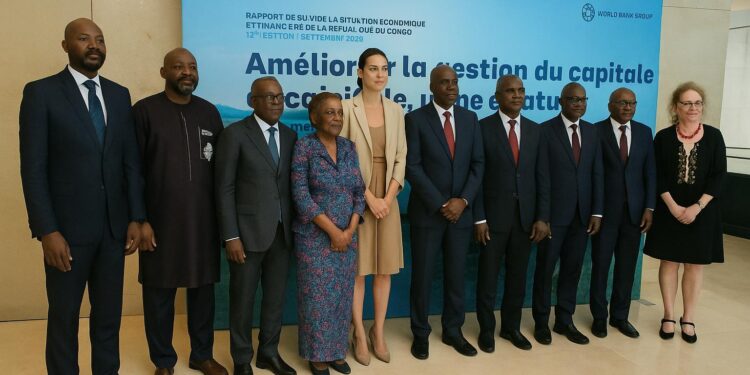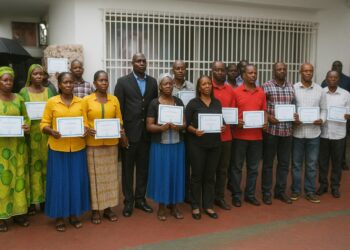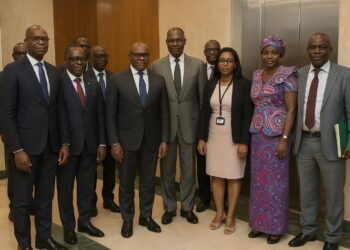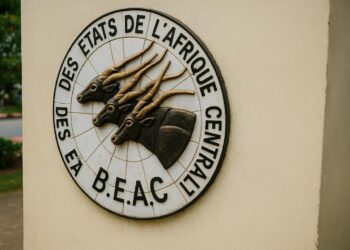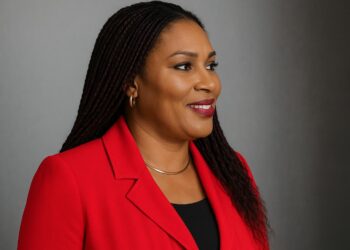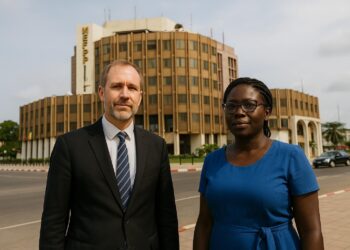World Bank 2025 findings on Congo
Brazzaville hosted the official launch of the World Bank’s 2025 Economic Update, the twelfth in the series tracking Congo-Brazzaville’s performance. Presented on 23 September at the Hilton Twin Towers, the document offers a cautiously upbeat narrative: per-capita income is rising again for the first time since 2015.
Governance at the heart of value creation
Lead author Kabinet Kaba summed up the central message, stating that higher living standards depend on “better management of produced, human and natural capital” (World Bank 2025 report). The Bank argues that transparent fiscal management and agile public services can translate growth into jobs and poverty reduction.
Macroeconomic signals after global shocks
Economic Affairs Minister Ludovic Ngatsé underlined Congo’s resilience to external headwinds such as the pandemic and the conflict in Ukraine. Real GDP advanced 2.1 percent in 2023 and accelerated in 2024, while non-oil revenues expanded from 806.9 billion CFA francs to 1 075.3 billion CFA francs, reducing hydrocarbon dependence.
Capital produced, human and natural
For the first time, the update values national wealth through three lenses—produced assets, talent and ecosystems. Director Cheick Fantamady Kanté highlighted that pairing GDP analysis with wealth accounting “opens room for strategies that remain inclusive beyond commodity cycles”, a view shared by the United Nations country team.
Emerging sectors diversify growth
Private-sector representatives, led by Unicongo Secretary-General Nancy Chenard, noted momentum in mining, construction, telecommunications, agriculture and tourism. Yet executives still flag power reliability, para-fiscal costs and multiple inspections as hurdles. The Bank observes that only five percent of the nation’s ten million hectares of arable land is farmed, underscoring untapped potential.
Reform agenda and PPP opportunities
Government officials detailed ongoing measures: special economic and agro-industrial zones, the Electricity Sector Support Program, investment promotion codes and the rehabilitation of strategic transport corridors. The report encourages structured public-private partnerships, insisting that quality pipelines and risk-sharing mechanisms can mobilise long-term capital from local and international financiers.
Human capital as growth engine
World Bank economists Chris Belmert Milindi Katindi and Kabinet Kaba emphasise education and health as catalysts for sustained productivity. They recommend targeted budget increases, market-aligned technical training and private-sector participation in curricula design. Better human capital, they argue, not only raises incomes but also strengthens social cohesion.
Poverty and inclusion metrics
Despite macro improvements, the poverty rate remains elevated. The report stresses that inclusive employment has yet to follow headline growth, especially outside major cities. Rural electrification, financial inclusion and digital connectivity are portrayed as levers to spread opportunity and temper regional disparities.
Debt and cash-flow management
Short-term priorities include sharpening debt and cash-flow oversight. Kanté cited progress in Treasury single-account deployment and expenditure controls, noting that disciplined liquidity management can preserve investor confidence during commodity swings and safeguard funding for social programmes.
Climate and natural capital stewardship
Congo’s forests anchor the second-largest tropical basin on the planet. The Bank advises mainstreaming carbon revenue, community forestry and climate-smart agriculture into fiscal plans. Proper valuation of biodiversity, it says, can attract green finance while supporting global decarbonisation efforts.
Energy transition outlook
Oil remains significant, yet authorities explore gas-to-power projects, solar micro-grids and regional interconnections to stabilise supply and curb emissions. Investors are watching regulatory clarity on feed-in tariffs and carbon credits, topics addressed in annexes of the 2025 report and echoed by the Ministry of Hydrocarbons.
Digital leap and fintech
Telecom subscriptions exceed the regional average, positioning Congo as a test bed for mobile money, agri-tech and e-government services. The update cites recent interoperability guidelines from BEAC and COBAC that could broaden fintech participation and deepen credit markets for small and medium enterprises.
Charting non-oil fiscal space
A comparative chart in the report shows customs, VAT and excise taxes gaining weight in total receipts. This diversification, paired with expenditure rationalisation, provides additional headroom for infrastructure and social investment without compromising fiscal prudence, according to ministerial officials interviewed during the launch.
Investor sentiment and risk profile
Participants from regional banks consider the current environment stable, supported by improved arrears clearance and moderated inflation. They nevertheless monitor global interest rates, noting that prudent external borrowing strategies will remain essential to maintain Congo’s favourable risk rating by Central African monetary authorities.
Collaborative implementation framework
Closing the ceremony, public and private stakeholders reaffirmed a shared commitment to a diversified, resilient and inclusive economy. The World Bank offered technical assistance for monitoring indicators, while the government pledged an open dialogue platform to track reform milestones and accelerate project execution.
Key takeaways for investors
The 2025 update positions Congo-Brazzaville as a reform-minded, resource-rich market preparing for post-oil realities. Governance reforms, human capital investment and targeted public-private partnerships define the roadmap. For long-term investors, the signal is clear: opportunity lies in supporting sectors that convert the nation’s broad asset base into sustainable value.

































